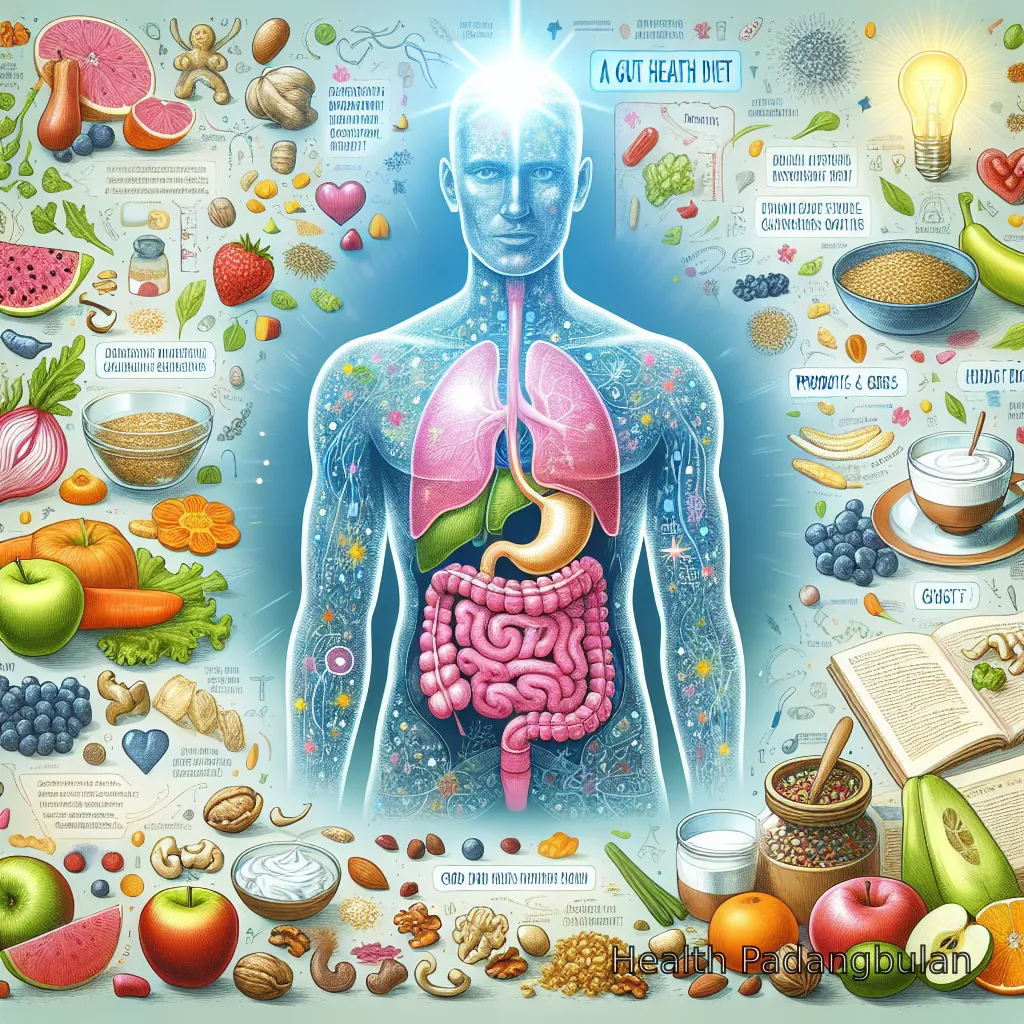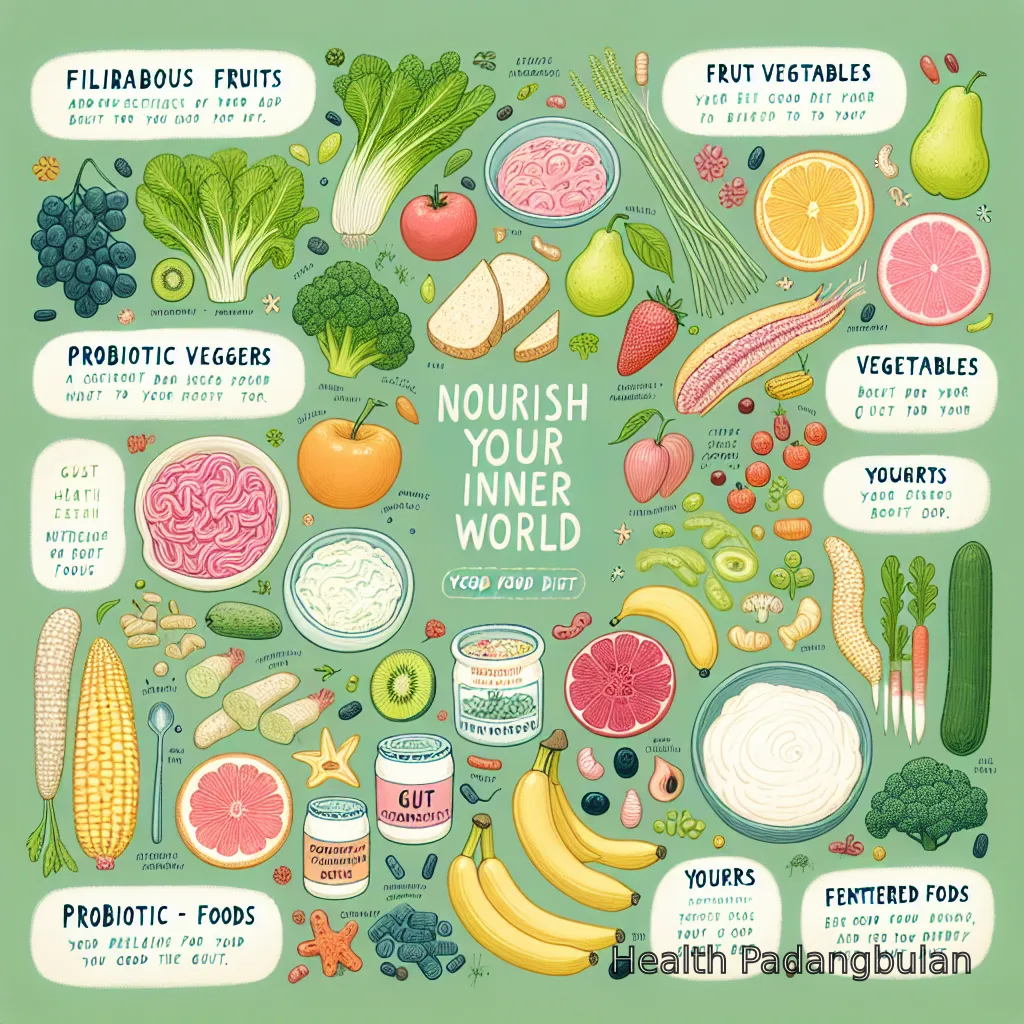Imagine your gut as a bustling inner city, teeming with tiny residents (trillions of them!) all working hard to keep things running smoothly. When this city is vibrant and balanced, you feel fantastic – energized, clear-headed, and resilient. But when it’s out of whack, well, things can get a little… sluggish, gassy, or just plain uncomfortable. That’s where the magic of a **Gut Health Diet** comes in!
It’s not about strict deprivation or counting every calorie; instead, it’s a journey to discover foods that nourish your body from the inside out, fostering a thriving environment for your **healthy gut microbiome**. Ready to transform your well-being and unlock a happier, healthier you? Let’s dive into the delicious world of gut-friendly eating!
Why Your Gut is the Ultimate VIP of Your Body

Before we talk about what to eat, let’s appreciate *why* your gut deserves star treatment. Your gut, particularly your large intestine, is home to trillions of microorganisms—bacteria, viruses, fungi—collectively known as your gut microbiome. Think of them as tiny, diligent workers performing crucial jobs. They don’t just help digest your food; they play a monumental role in nearly every aspect of your health!
Read also : healthy gut microbiome
A balanced **healthy gut microbiome** is linked to a strong immune system (about 70% of your immune cells reside in your gut!), better mood regulation, improved nutrient absorption, and even skin health. When your gut flora is out of balance, known as dysbiosis, it can contribute to a host of issues from digestive discomfort to fatigue, mood swings, and inflammation throughout the body. It’s a bit like having a riot in your inner city – chaos ensues! A well-chosen **Gut Health Diet** is your ticket to bringing peace and prosperity back to this vital internal ecosystem.
The Pillars of a Gut Health Diet: What to Load Up On
Building a gut-friendly plate is simpler than you might think. It’s all about providing your tiny gut inhabitants with the fuel they love, which, in turn, helps them help *you*. Think of colorful, whole, and unprocessed foods as the superstars. Here’s what takes center stage:
Read also : fiber rich foods
### Fiber: Your Gut’s Best Friend Forever
If your gut bacteria could write a thank-you note, it would be addressed to fiber. Fiber isn’t digested by your body, but it’s pure gold for your gut microbes. It acts as a prebiotic, feeding the beneficial bacteria and helping them flourish. There are two main types:
* **Soluble fiber:** Dissolves in water, forming a gel-like substance that can help soften stool and is often found in oats, beans, apples, and citrus fruits. * **Insoluble fiber:** Doesn’t dissolve, adding bulk to your stool and helping waste move through your digestive system more easily. Think whole grains, nuts, and many vegetables.
Loading up on **fiber rich foods** is perhaps the most impactful change you can make to your **Gut Health Diet**. Start slowly if you’re not used to a high-fiber intake to avoid discomfort, and always drink plenty of water to help the fiber do its job!
Probiotics & Prebiotics: The Dream Team for Your Tummy
These two terms often get tossed around together, and for good reason—they’re a dynamic duo for gut health!
* **Probiotics:** These are live beneficial bacteria and yeasts that directly add to the population of healthy microbes in your gut. Think of them as restocking your inner city with good, productive citizens. Fermented foods are your primary source of dietary probiotics. Many cultures worldwide have traditionally relied on fermented foods for their health benefits. For example, kimchi in Korea, sauerkraut in Germany, and tempeh in Indonesia are all fantastic additions to a **Gut Health Diet**.
* **Prebiotics:** As we discussed, these are types of fiber that act as food for your gut’s beneficial bacteria. They create a fertile ground for probiotics to thrive. You can’t have a bustling city without good infrastructure, right? Prebiotics are that infrastructure!
### Your **Probiotic Foods List** (and Prebiotic Powerhouses!):
Incorporating these into your daily routine is a delicious way to support your gut:
* **Yogurt & Kefir:** Look for options with ‘live and active cultures’ and minimal added sugar. These are dairy-based fermented products. * **Sauerkraut & Kimchi:** Fermented cabbage dishes that pack a probiotic punch. They’re savory, tangy, and excellent as a side dish or topping. * **Tempeh:** A fermented soybean product that’s a fantastic source of plant-based protein and probiotics. * **Miso:** A savory fermented soybean paste used in Japanese cuisine. * **Onions, Garlic, Leeks:** Excellent sources of prebiotics. * **Asparagus, Bananas, Chicory Root:** More prebiotic-rich options that nourish your existing good bacteria. * **Oats & Barley:** Whole grains that offer both fiber and prebiotic benefits.
By consciously adding foods from this **probiotic foods list** and ensuring a good intake of prebiotics, you’re giving your gut the best possible chance to flourish.
Foods to Embrace for a Happy Gut

Beyond fiber, prebiotics, and probiotics, a diverse range of whole foods contributes to a robust gut:
* **Colorful Fruits and Vegetables:** The more variety, the better! Each color often signifies different phytonutrients that can positively impact your gut. Berries, leafy greens, broccoli, carrots, and sweet potatoes are fantastic choices. They also provide crucial vitamins and minerals. * **Whole Grains:** Brown rice, quinoa, whole wheat bread (if tolerated), and oats are excellent sources of complex carbohydrates and fiber, sustaining your energy levels and feeding your gut. * **Legumes:** Lentils, chickpeas, and beans are powerhouses of fiber and plant-based protein. While they might cause gas initially for some, gradual introduction often builds tolerance. * **Healthy Fats:** Avocado, olive oil, and fatty fish (like salmon) provide anti-inflammatory omega-3s, which can soothe the gut lining. Think of these as the calming agents in your gut city, reducing any internal strife. * **Bone Broth:** Rich in collagen and amino acids like glutamine, bone broth can help repair and strengthen the gut lining, making it a soothing addition for many.
What to Limit or Avoid: Giving Your Gut a Break
Just as there are foods your gut loves, there are others it tolerates less kindly. Reducing or avoiding these can significantly improve your digestive comfort and overall gut health:
* **Highly Processed Foods:** These often contain artificial ingredients, unhealthy fats, and excessive sugar, which can disrupt your **healthy gut microbiome** and promote inflammation. Think packaged snacks, fast food, and ready meals. * **Added Sugars:** Sugar feeds harmful bacteria and yeasts in the gut, leading to an imbalance. It’s also a major culprit for inflammation. Reading labels for hidden sugars is key! * **Artificial Sweeteners:** Some research suggests that certain artificial sweeteners can negatively impact the gut microbiome, ironically contributing to metabolic issues. It’s often better to opt for natural sweetness from fruit or reduce overall sweetness in your diet. * **Excessive Alcohol:** While an occasional glass might be fine for some, chronic or heavy alcohol consumption can irritate the gut lining and disrupt its balance. * **Fried Foods and Unhealthy Fats:** These can be difficult to digest and contribute to inflammation. * **Certain Dairy or Gluten (for some):** While not universally bad, some individuals have sensitivities to lactose (in dairy) or gluten (in wheat, barley, rye) that can cause significant digestive distress, including symptoms often mistaken for **acid reflux diet** issues. If you suspect these are problematic for you, consider a temporary elimination diet under professional guidance.
Remember, it’s not about perfection, but progress. Small, consistent changes often yield the biggest rewards.
Beyond Food: Lifestyle Habits for a Thriving Gut
A **Gut Health Diet** is incredibly powerful, but it’s part of a larger wellness puzzle. Your lifestyle choices profoundly impact your gut:
* **Manage Stress:** The gut and brain are intimately connected via the gut-brain axis. Chronic stress can directly alter your gut microbiome and gut motility, contributing to issues like irritable bowel syndrome (IBS) or **acid reflux diet** challenges. Incorporate stress-reducing activities like meditation, yoga, or spending time in nature. * **Prioritize Sleep:** Lack of sleep can throw off your internal rhythms, including those of your gut bacteria. Aim for 7-9 hours of quality sleep per night. * **Stay Active:** Regular physical activity can positively influence gut microbial diversity and improve bowel regularity. * **Hydrate Adequately:** Water is essential for proper digestion, nutrient absorption, and maintaining soft, easy-to-pass stools. It helps the fiber do its work efficiently. * **Consider Supplements (Wisely):** While food should always be your primary source of nutrients, certain supplements can be beneficial. **Digestive enzymes supplements** can assist in breaking down food, especially if you have insufficient natural enzyme production. Probiotic supplements can provide targeted strains of beneficial bacteria, and prebiotics can further support them. *Always consult with a healthcare professional before starting any new supplement regimen*, as specific needs vary greatly.
Conclusion
Embarking on a **Gut Health Diet** is more than just a trend; it’s an investment in your overall health and vitality. By focusing on whole, unprocessed foods, embracing **fiber rich foods** and the power of the **probiotic foods list**, and making mindful lifestyle choices, you’re nurturing the incredible ecosystem within you. It’s a journey of discovery, listening to your body, and building a stronger, more resilient you from the inside out. Start small, be consistent, and watch as your inner city transforms into a thriving metropolis of well-being!
References
FAQ
What exactly is a Gut Health Diet?
A Gut Health Diet is an eating plan focused on consuming foods that promote a diverse and balanced population of beneficial microorganisms (the microbiome) in your digestive tract. It emphasizes whole, unprocessed foods, high fiber, prebiotics, and probiotics, while limiting foods that can harm gut health.
How quickly can I see results from a Gut Health Diet?
Results vary for each individual, but many people report feeling improvements in digestion, energy levels, and mood within a few weeks to a couple of months of consistently following a Gut Health Diet. Significant changes in the microbiome can take longer, often several months.
Can a Gut Health Diet help with acid reflux?
Yes, for many people, a **Gut Health Diet** can significantly alleviate symptoms of acid reflux. By reducing inflammatory foods, incorporating soothing options like bone broth, and balancing the gut microbiome, it can help improve overall digestive function and reduce the factors contributing to reflux. However, it’s essential to consult a doctor for persistent or severe reflux.
Are digestive enzymes supplements necessary for gut health?
**Digestive enzymes supplements** can be helpful for some individuals, particularly those who have difficulty breaking down certain foods or have conditions that impair natural enzyme production. They are not universally necessary, and it’s best to consult with a healthcare professional to determine if they are right for you.
What is the difference between probiotics and prebiotics?
Probiotics are live beneficial bacteria and yeasts that you consume (e.g., in fermented foods) to add to your gut’s microbial population. Prebiotics are types of non-digestible fiber that act as food for your gut’s existing beneficial bacteria, helping them to grow and thrive. They work synergistically to improve gut health.
Is coffee good or bad for gut health?
The effect of coffee on gut health can be individual. For some, moderate coffee consumption (without excessive sugar or artificial additives) may even have prebiotic benefits. For others, it can exacerbate issues like acid reflux or IBS due to its acidity and stimulant properties. Listen to your body and moderate intake as needed.
What’s the best probiotic food?
There isn’t a single ‘best’ probiotic food, as diversity is key. Excellent choices include unsweetened yogurt or kefir with live cultures, sauerkraut, kimchi, tempeh, and miso. The best approach is to include a variety of these fermented foods in your **Gut Health Diet** to get a broad spectrum of beneficial bacteria.